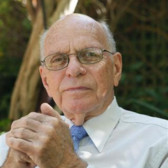
David Tunley AM FAHA Chevalier de l’Ordre des Palmes Académiques was born in Sydney and grew up in the country town of Gulgong in New South Wales, moving as a boarder to Sydney for his secondary education. He went on to do a Diploma in Music at the Sydney Conservatorium, specialising in piano–the Bachelor’s Music degree was not yet established–learning mainly from pianist Alexander Sverjensky (1947–50) and also benefiting from interchange with Raymond Hanson and Eugène Goossens. After graduating he undertook a graduate Diploma in Education at Sydney University, following which he was bonded for five years to the Education Department. He got a job at the select entry Fort Street Boys’ High School in Sydney 1953 to 1957. David used to reminisce modestly but with obvious pride of the impact he made on the boys he taught there, many of whom would contact him out of the blue in their later lives to tell him so. Justice Michael Kirby was one of his students. While teaching at Fort Street Tunley also enrolled as an external student in the BMus degree at the University of Durham, as they wouldn’t accept part-time students into the degree programme at the Sydney Conservatorium. He graduated with his BMus from Durham in 1958.
In 1958 Tunley joined the staff of the University of Western Australia, as lecturer in music education. At that time, music was under the wing of the Faculty of Education, Frank Callaway was the head of department, a charismatic international figure who was attracted to Tunley’s application as he was a practically trained musician and had teaching experience. During his years teaching at Fort Street, Tunley had needed to acquire many basic compositional and arrangement skills and had become very interested in composition. In his early years as a lecturer, he again undertook study for another external degree at the University of Durham and was awarded his MMus degree in composition in 1963.
On his first study leave from UWA, Tunley applied for and was awarded a prestigious French government scholarship, sadly no longer available in the same format. He applied to study composition in Paris from 1964–5, under the famous composition teacher Nadia Boulanger who was then in her 70s. He completed his Concerto for Clarinet and String Orchestra while studying with Boulanger in Paris. He also began to be seriously interested in research and in particular in French music. An Australian painter friend in Paris, Moya Dyring, introduced him to Jeff Hanson, second husband of the Australian patron and music publisher Louise Dyer (who had died the year before). Jeff recommended David contact the head of the music department at the Bibliothèque Nationale, François Lesure, for advice. David met up with Lesure, they got on extremely well and Lesure advised him that the French cantata of the eighteenth century was crying out for research. David responded with alacrity and immediately started research in the Music Department. Many years later in the early 1980s I came to do my PhD with Lesure. I had been recommended to him by my supervisor Meredith Moon who before taking up a teaching job in Melbourne had been the music librarian at the Bodleian Library in Oxford and knew Lesure through library connections. The first thing he asked me was “comment va David Tunley?”. France was not a popular destination for Australian musicologists in the twentieth century, particularly in comparison to the United Kingdom and I am sure the warm welcome I received from Lesure so many years later was connected to his fond memories and respect for Tunley.
No sooner embarked on his research project than it was time to return to Perth and Tunley realised that he would need to have all the repertoire he wished to study microfilmed. He wrote to Frank Callaway who contacted WA University librarian, Leonard Jolley, who organised for all the works to be put on microfilm for the library. Consequently, Perth became the location of the largest collection of eighteenth-century French cantatas outside of France. It should be pointed out that it wasn’t guaranteed that one was granted permission to copy manuscripts from the Music Department of the Bibliothèque Nationale–it depended on the agreement of the Head of the Department, so Tunley had a true ally in Lesure. Tunley later made sure the microfilms’ existence was widely known by publishing an annotated catalogue of the 220 cantatas on microfilm held by the Perth Reid University Library, preceded by a summary of the historical and stylistic development of the cantata form.
Tunley’s research on the cantatas earned him the degree of Doctor of Letters (UWA 1970) and his resultant book The 18th-Century French Cantata (1974) is still regarded as the classic study of this topic. A second enlarged edition of the book appeared in 1997. Tunley also published a BBC guide to the music of François Couperin (1982) reworked many years later as “both a second edition and a new publication” (vii): François Couperin and ‘The Perfection of Music‘ (2004). Graham Sadler commented in his review of this book that the new material provided a “clear-sighted introduction to a topic that is fundamental to an understanding not only of Couperin but also of most contemporary French Baroque music” (Early Music 2005). Jane Clark’s review claimed that “like Couperin, the author’s writing is a model of clarity…[the] author’s great love of the music rings from every page and is inspiring” (Eighteenth-Century Music, 2006). Tunley was still working on Couperin in 2013 when he completed a new annotated bibliography for Oxford University Press, including listings of archival sources and editions of Couperin’s works.
Tunley’s academic output encompassed extraordinarily varied topics. He continued his interest in French music with six edited volumes of Romantic French Song with translations and commentaries (New York: Garland, 1994–95) and the research for the preparation for these editions became a monograph on the social significance of French song in the French salon (Salons, Singers and Songs: A Background to Romantic French Song, 1830-1870, 2017). He also worked on the history of music theory and its applied harmonic practices, publishing a foundation text on harmony. To quote Baroque scholar James Anthony, Tunley “swept his way from the 18th century French cantata to the late 19th century French Romance, backtracking to French Air, pausing to fashion a beginning harmony textbook” … “he deserves a place in the contemporary Parnasse françois”.
Australian music history was also a passion of Tunley’s and amongst other things, he published co-edited books on Australian composition in the twentieth century and on the Perth-born pianist Eileen Joyce, and a single authored monograph on William James (1995). His interest in contemporary composition in Australia cannot be overestimated. He mounted symposia in Perth and published proceedings and articles on topics such as Music in Australian Universities and Conservatoria, Recent Developments in Music at Australian Universities and Conservatoria, The Contemporary Australian Composer and A Decade of Musical Composition in Australia: 1960–1970. From 1967 to 1994 Tunley was also co-editor, then editor in chief of Studies in Music. This journal put out by the University of Western Australia published many important articles by musicologists across Australia and beyond.
Tunley’s academic legacy includes the authorship of eight books and more than 70 scholarly articles, as well as 23 volumes of editions of eighteenth and nineteenth-century French music.
Tunley stayed at the University of Western Australia in Perth where he became Professor of Music (1980–94) and Head of Department (1985–90), and was elected Professor Emeritus in 1994.
His musical activities in Perth went beyond the University. He founded and conducted the Perth chamber choir Collegium Musicum, introducing audiences to new repertoire, for instance Machaut’s Messe de Nostre Dame, a concert version of Rameau’s Hippolyte et Aricie and Stravinsky’s Les Noces with the WA ballet. With Margaret Sears, Tunley put on the second modern-day staged performance of Lully’s Armide to mark the tercentenary of Lully’s death in 1987; the British soprano Jane Manning played the lead role. Tunley also set up and directed the biennial York Winter Music Festival in rural Western Australia (1982–93) and was involved in many other local musical ventures.
He assumed many leadership roles in music, including as chairman of the Music Board of the Australian Council (1984–5), national president of the Musicological Society of Australia (1980–81), and federal chairperson of the Australian Music Examinations Board (1995–6), In this later role he particularly he is remembered by many for his sage council. Under David’s leadership an editorial policy was developed for publications issued under the authority of the Board. Although no longer current, for a number of years the policy ensured that publications for all syllabuses were produced in a scholarly manner and according to consistent editorial and stylistic principles.
Tunley was a scholar in residence at the Rockefeller Study Centre at Bellagio, Italy (1987), a Fowler Hamilton Visiting Research Fellow at Christ Church, Oxford (1993), and visiting scholar at Wolfson College, Oxford (1996). In 1980 he was elected Fellow of the Australian Academy of the Humanities, and in 1983 became a Chevalier dans l’Ordre des Palmes Académiques. He was made a Member of the Order of Australia in 1987.
David Tunley’s academic achievements were great and deserve commemoration; he was one of Australia’s most important internationally renowned music scholars, and also a significant composer, teacher, choral conductor and music administrator. But there are other aspects of his career that are not so tangible, but equally worth noting. I am talking of his special mentoring, and his extraordinary encouragement and generosity towards young scholars.
Music scholars visiting Perth (I am using the word scholar deliberately since David did not like the word musicologist!) were always welcomed and entertained by David and his wonderful wife Paula, one was made to feel special. David always wanted to know what you were doing in your research and if he could help in any way, he often could. He influenced generations of musicians and scholars in Perth, but he also informally mentored so many others across Australia. His enthusiasm and warmth, his genuine interest in others, his lack of pretension and lively sense of humour made him a very special person. We mourn his death but his inspirational presence and scholarly legacy will not be forgotten.
Professor Tunley is survived by his wife Paula, and children Sonia, Martin and Rachel.
Professor Kerry Murphy FAHA
University of Melbourne



